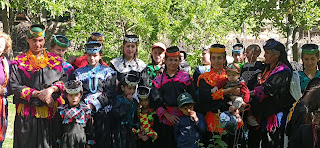The existing anthropological literature about the
Kalasha menstrual house assumes
that the bashali
(basˇa´li) is
a
place where
women are restricted, confined,
exiled (Schomberg 1938; Siiger 1956; Graziosi 1961; Palwal 1972; Robertson 1896).
An image of the goddess Dezalik was kept in the Bashali, or women’s house; Men are not
allowed to enter the Bashali, where women are relegated
when they are in a state of impurity.
The segregation of women during the menstrual
period and at childbirth is of course
practiced among many different
peoples. The horror felt for their
state, considered impure, leads primitive communities
to take all the necessary precautions to avoid dangerous contacts between impure women and all other members of the group.
The Bashali in the
village of Batrik did not work for a long time due to major damage to the
electrical and plumbing systems and the lack of water drainage.
Batrik's women were
obliged to go to Bashali who were in other villages.
All start with a
meeting.
A meeting of the
representatives of the residents of Batrik was held, consisting of them, Ghani,Jani
Gul, Rumeela, Kamazar, Jamlana, Gurum, Khorma Gul, Anwas Bigim, Zakhira,
Gulshana, Nasira, Fatima, Sabira, Gul Mer,
Rashi Beg, Rahmat Ullah, Gul Mia, Noor Shairan, Basir Muhammad, Ghazi
Muhammad and it was decided to immediately start work on the restoration of the
site.
Who will get in?
Is it necessary to
purify or even sacrifice an animal?
The materials were
purchased from the city of Chitral and after 7 days of intensive work Bashali
was opened again for the women of Batrik.



























Δεν υπάρχουν σχόλια:
Δημοσίευση σχολίου